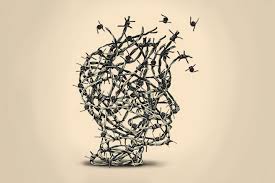Complex trauma, also known as complex post-traumatic stress disorder (C-PTSD), is a profound and multifaceted condition that arises from exposure to prolonged and severe stressors, often occurring within interpersonal relationships. While traditional post-traumatic stress disorder (PTSD) focuses on the impact of a single traumatic event, complex trauma encompasses a broader range of experiences, such as chronic abuse, neglect, or exposure to multiple traumatic incidents. In this article, we will delve into the intricacies of complex trauma, exploring its definition, causes, symptoms, and the nuanced journey toward healing.
Defining Complex Trauma
- Beyond Single Incidents:
Unlike acute trauma, which results from a single traumatic event, complex trauma involves exposure to a series of distressing and often interrelated experiences over an extended period. These experiences are typically interpersonal in nature, occurring within relationships where safety and trust are compromised. - Impact on Development:
Complex trauma can significantly impact an individual’s psychological and emotional development, particularly when the trauma occurs during critical stages of growth. Childhood exposure to prolonged adversity, such as abuse or neglect, can shape the individual’s perception of self, others, and the world.
Causes and Contributing Factors
- Childhood Abuse and Neglect:
Early-life experiences of physical, emotional, or sexual abuse, as well as neglect, can contribute to the development of complex trauma. The absence of a secure attachment figure during childhood may hinder the development of essential coping mechanisms. - Repetitive Trauma:
Complex trauma often involves exposure to multiple traumatic incidents, creating a cumulative effect that amplifies the impact on an individual’s mental and emotional well-being. This can include ongoing domestic violence, repeated interpersonal betrayals, or prolonged exposure to war and conflict. - Lack of Supportive Relationships:
The absence of a reliable and supportive social network, especially during formative years, can exacerbate the effects of complex trauma. The lack of validation and understanding from others may contribute to feelings of isolation and emotional distress.
Symptoms of Complex Trauma
- Emotional Dysregulation:
Individuals with complex trauma may struggle with intense and unpredictable emotions, finding it challenging to regulate their emotional responses to various stimuli. Mood swings, heightened reactivity, and difficulties in managing stress are common manifestations. - Disturbed Self-Perception:
Complex trauma can shape an individual’s self-perception, leading to feelings of shame, guilt, and a distorted sense of identity. Survivors may struggle with low self-esteem and a pervasive sense of unworthiness. - Difficulty in Establishing Relationships:
Trust and intimacy can be particularly challenging for those with complex trauma. Fear of betrayal, abandonment issues, and difficulties in forming secure attachments may impact the ability to cultivate healthy relationships. - Cognitive Distortions:
Persistent negative thoughts and beliefs about oneself, others, and the world are common cognitive distortions associated with complex trauma. These distortions often result from internalizing the negative messages received during traumatic experiences.
Treatment Approaches for Complex Trauma
- Trauma-Informed Therapy:
Trauma-informed therapies, such as Eye Movement Desensitization and Reprocessing (EMDR) and Sensorimotor Psychotherapy, aim to address the impact of trauma on the body and mind. These approaches focus on fostering a sense of safety, building coping mechanisms, and processing traumatic memories. - Dialectical Behavior Therapy (DBT):
DBT combines cognitive-behavioral techniques with mindfulness practices to help individuals regulate emotions, improve interpersonal effectiveness, and develop coping strategies. It is particularly effective in addressing emotional dysregulation associated with complex trauma. - Attachment-Based Therapies:
Given the relational nature of complex trauma, therapies that focus on repairing and enhancing attachment relationships can be beneficial. This includes interventions like Attachment-Based Family Therapy (ABFT) and Emotionally Focused Therapy (EFT). - Medication Management:
In some cases, medication may be prescribed to address specific symptoms of complex trauma, such as depression, anxiety, or sleep disturbances. Medication should be administered under the guidance of a mental health professional.
The Road to Healing
- Building a Support System:
Establishing a supportive network is crucial for individuals recovering from complex trauma. This may include friends, family, support groups, and mental health professionals who can offer understanding, empathy, and validation. - Self-Care Practices:
Engaging in self-care activities is integral to the healing process. Practices such as mindfulness, relaxation exercises, regular physical activity, and maintaining a healthy lifestyle contribute to overall well-being. - Empowerment and Resilience:
Encouraging survivors to recognize and cultivate their strengths, resilience, and coping skills is essential. Empowerment plays a pivotal role in reclaiming control over one’s life and fostering a sense of agency.
Conclusion
Complex trauma represents a profound and intricate challenge for those who have experienced prolonged exposure to severe stressors. Recognizing the nuanced nature of complex trauma is crucial for both survivors and those providing support. By fostering a trauma-informed approach, embracing effective therapeutic interventions, and building a network of understanding and validation, individuals can embark on a journey towards healing and reclaiming their lives from the profound impact of complex trauma.
